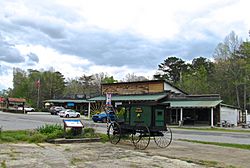Coker Creek, Tennessee facts for kids
Quick facts for kids
Coker Creek, Tennessee
|
|
|---|---|

Shops in Coker Creek
|
|
| Country | United States |
| State | Tennessee |
| County | Monroe |
| Elevation | 1,624 ft (495 m) |
| Population
(2020)
|
|
| • Total | 150 |
| Time zone | UTC-5 (Eastern (EST)) |
| • Summer (DST) | UTC-4 (EDT) |
| ZIP code |
37314
|
| Area code(s) | 423 |
| GNIS feature ID | 2813107 |
Coker Creek is a small community in Monroe County, Tennessee, United States. It is not a city but an unincorporated community. This means it does not have its own local government.
Coker Creek is found in the southern Appalachian Mountains. It is completely surrounded by the Cherokee National Forest. The area is known for its beautiful nature, including rhododendron and laurel plants. Many hiking trails are also found here. People enjoy trout fishing in the local streams. The community has homes, businesses, churches, and even a Christian summer camp. In 2020, about 150 people lived in Coker Creek.
Contents
Exploring Coker Creek's Past
Coker Creek has a rich history that dates back many years. It was once an important place for Native Americans and later for gold miners.
Early Cherokee Life
Before European settlers arrived, Coker Creek was land belonging to the Cherokee people. They called the area "Coco" or "Coqua," which means "butterfly weed." This plant was common there.
Archaeologists have found signs that people lived here long ago. They believe a stone tool factory existed during the Archaic Period. This was a time when early humans made tools from stone.
An old trading path used by the Cherokee passed through Coker Creek. This path connected different Cherokee towns. In 1816, this path became a road called the Unicoi Turnpike.
The Gold Rush in Tennessee
Europeans learned about gold in the area from the Native Americans. In 1827, people started mining for gold illegally. More prospectors and settlers soon followed.
A man named Robert Tunnell opened a post office in 1831. Philip Meroney ran a "stock stand," which was like a service station for travelers.
The Cherokee complained about the illegal mining. So, a fort called Fort Armistead was built. Its purpose was to stop the gold miners. Later, this fort became a stop for the forced removal of the Cherokee people.
Coker Creek became famous for its gold. It produced about 9,000 ounces (255 kg) of gold. This was almost all the gold ever found in Tennessee. Miners used simple tools to get the gold.
Coker Creek During the Civil War
The Civil War (1861-1865) brought challenges to Coker Creek. Many local people did not support the Confederate government. Some people hid in the mountains during this time.
Soldiers from both sides passed through the community. However, there were no big battles in Coker Creek itself. Gold mining stopped during the war. It started again afterward and continued until 1911.
In the 1930s, a Civilian Conservation Corps camp was set up on the old turnpike. This camp helped young men find work during the Great Depression. Later, it became a Boy Scout camp.
A New Church Begins
In 1884, a local miller and minister named R. G. Spurling was expelled from his church. He had been preaching to people who were not Baptists. After two years of studying the Bible, he started a new group called the Christian Union. This group was an early part of the Pentecostal Church of God. Today, a marker near Coker Creek shows where this church began.
Learning in Coker Creek
The children of Coker Creek attend public schools run by Monroe County Schools. Coker Creek School serves the community's students.
 | Frances Mary Albrier |
 | Whitney Young |
 | Muhammad Ali |



